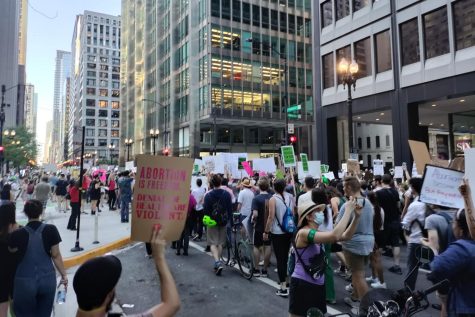Editorial: No time for Columbia’s silence following disastrous Roe v. Wade decision
July 1, 2022

Columbia’s student body is a unique collection of people from around the country, all united in Chicago. And while abortion remains legal in Illinois, there are many states — some which our students call home — that have already blocked abortion rights, making this issue especially threatening to our community.
The Chronicle editorial board discussed the Supreme Court’s recent decision to overturn the 49-year precedent of Roe v. Wade and the right to choose to have an abortion. We stand in support of abortion as health care and believe the recent restrictions are the result of an unjust decision that puts the mental health and overall well-being of anyone who can birth a child at risk.
This action will have a historic ripple effect on equal opportunities for women, the trans and nonbinary community and people of color, and it will not end abortions — only the right to a safe abortion and body autonomy.
The judges sitting on the highest court in the U.S. should be elected by the people, not appointed by presidents. The enactment of Dobbs v. Jackson granting individual states the right to make their own laws recognizing abortion as a right or not has allowed six states to already revoke this human right, marking the beginning of a long, arduous period of litigation.
But the banging of the gavel in this case doesn’t end with just the loss of a right to a safe abortion. We know the right to contraception, same-sex marriage, trans rights, freedom of speech, freedom to organize and voting rights are also being threatened — all shortly after the mass shooting in Uvalde, Texas, which led to little resulting governmental action on gun control.
The Chronicle encourages students to exercise their right to vote in all elections for representatives at the local, state and federal levels, which is of even greater importance for people who may be from a swing state.
But we are frustrated that the political process has failed to protect the right to an abortion and other rights recently lost.
In the case of the Supreme Court, we also recognize religion’s unlawful role in the Roe v. Wade decision that shows a lack of regard for the First Amendment, which states: “Congress shall make no law respecting an establishment of religion.”
The harmful impacts of the reversal of Roe will fall hardest on Black and Brown women, people with disabilities and trans and nonbinary people, groups who are already suffering the highest mortality rates during pregnancy and childbirth due to racist, ableist and transphobic health care practices.
With the U.S. being a country whose citizens already lack equal access to health care, paid maternity leave, adequate mental health resources and properly funded foster care services, this will further deepen the economic divide and affect who will have access to abortion in a post-Roe world.
Forced childbirth will also disrupt educational pursuits and future economic earnings for women in the U.S. who may already not be receiving equal pay.
While we support private companies that have announced abortion resources and financial support they plan to provide to employees in need of reproductive care in the aftermath of Roe’s repeal, it is yet to be determined what privacy rights and protections employees may be forced to compromise.
We worry that a company will use this as leverage over its employees and are skeptical of corporations’ intentions. Further, will this corporate commitment stand legal tests as states across the country enact — or try to enact and enforce — a myriad of abortion laws that may encourage private citizens to rat out individuals who seek an abortion or the doctors, medical practitioners or clinics who provide an abortion? Will states try to criminalize individuals who cross state lines for an abortion or the companies, clinics or individuals who assist them in doing so?
In the midst of the disheartened emotions we feel, we know it is imperative to mobilize beyond voting and for students not to be intimidated into silence on a topic that directly affects us.
But institutions of higher education have a role in this effort to protect the right to abortion, too. The Chronicle calls on Columbia’s administration to make a statement in support of students and provide a list of abortion resources they can access, as well as offer additional counseling services for students. The college should recognize that we have many students enrolled at Columbia from out of state, including states where abortion is now banned, or have bans hanging in the balance.
We expect Columbia to support us when our government is not, and the college’s continued silence on the issue is unacceptable. Columbia has shown time and time again a lack of communication and emotional support for students on issues that we take seriously.
The Chronicle plans to continue covering this topic to keep the issue at the forefront and updating our readers on new developments, and we see now, more than ever, the importance of holding people in power accountable.
We encourage the Columbia community to donate to Illinois abortion clinics and to be allies to those who might be from out of state and seeking resources.
We also call on all students to seek voting guidance through Columbia Votes, a nonpartisan campus resource providing students help with registering to vote in any state. Columbia Votes can also direct students to credible information about candidates on the local, state and federal level.
But taking action beyond voting is necessary, and organizing in any community you are a part of is another way we hope Columbia students can mobilize, express their voices and take action to protect this fundamental right now hanging in the balance.







